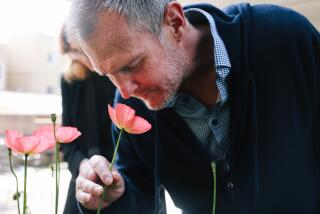Moussaoui’s Sisters Defend ‘Sweetheart’
- Share via
ALEXANDRIA, Va. — Zacarias Moussaoui’s two sisters told his jury Monday how their baby brother tried to escape the family’s poverty and abuse but instead fell under the spell of Muslim extremists who turned a hopeful young man into one filled with hate.
The videotaped testimony of his sisters, both of whom are mentally ill, was recorded last year. They were questioned at their quarters in separate institutions in France, only after it was certified that they had been taking medication to ward off schizophrenia.
They were interviewed in French; their answers were displayed in English subtitles on a dozen TV screens around the courtroom. Defense lawyers played the tapes to demonstrate the grave mental disorders that run in Moussaoui’s family, hoping to persuade the jury to spare their client’s life because he long ago lost his ability to reason.
The sisters, Djamilla and Nadia Moussaoui, often stared vacantly into the camera, showing little emotion about the brother they have not seen for more than a decade.
“I am in another reality,” Djamilla said of her own psychoses. “I can’t find myself. I’m in another place. The doctors tell me I will never be cured.”
Their father, Omar Moussaoui, who moved the family from Morocco to France, was an alcoholic who routinely beat their mother, Aicha. She and the children often went hungry; a dinner of potatoes or sardines was considered a feast.
The parents’ first son died of dehydration at 6 months of age. The second son, a week old, died after a botched circumcision.
Then came the two girls: Djamilla was hit in the head by a glass thrown by her father and later attempted suicide, while Nadia, who wanted to learn to dance, tried to escape by moving to Paris. But she could not shake the demons of her childhood.
“As an infant he hit me like an adult,” Djamilla said. “He made holes in my head.” But young Zacarias, she said, “was the little sweetheart of the family.”
They all hoped he would overcome his infancy spent in orphanages and his formative years fearful of his father and distrusting a mother who would not protect him.
Moussaoui was arrested three weeks before the Sept. 11, 2001, attacks while taking flying lessons in Minnesota. Last year he pleaded guilty to capital murder; the jury now must decide -- possibly by the middle of this week -- whether he lives or dies.
He has testified twice in his sentencing trial, expressing his glee at the nearly 3,000 people killed on Sept. 11. He also has boasted he was to fly a fifth plane that day into the White House.
Such bizarre behavior, his defense lawyers say, is indicative of a man who is mad. To emphasize that conclusion, the lawyers called to the witness stand two mental health experts who have examined Moussaoui or interviewed his relatives and friends.
Xavier Amador, a clinical psychologist, diagnosed Moussaoui as schizophrenic with “paranoid” tendencies. He said that three other mental health experts agreed, and that two others found Moussaoui “most likely” had “delusions and a schizophrenic thought disorder.”
Jan Vogelsang, a clinical social worker, said Moussaoui was the product of his broken home. “I’m going back three and four generations,” she said. “I heard stories after stories after stories of mental illness and starvation.”
Several of Moussaoui’s friends in his teenage years, testifying live in court or on videotape, recalled better times. He was ambitious, they said, and hoped to make a career in international business, but often was humiliated by racial prejudice.
He broke up with a girlfriend of six years and moved to London, where he eventually earned a master’s degree in business.
But fellow students in London said that after several setbacks, he came under the grip of radical Muslims hanging around a local mosque.
The mosque’s imam, Abdul Haqq Baker, said the radicals were always outside, passing out leaflets and trying to recruit young drifters. Baker said much of their rhetoric was vitriol against America and Israel.
Moussaoui soon began espousing their beliefs. He grew a beard and shaved his head. He came to the mosque in military clothing and talked about taking up arms for Islam.
“He kept asking me impatiently, ‘Where is the jihad in the world? Where is it?’ ” Baker said.
After the imam asked him to leave, Moussaoui returned to France.
According to witnesses, he repeatedly asked his mother to forgive him -- for what was never made clear -- before he could go on jihad. His ambition was gone. He was moody, often tired. He would sit in a chair for hours, crying. He mumbled.
That behavior is similar to what he does now. Vikas Ohri, a deputy guard in the Alexandria jail, said Moussaoui often stands at a wall in his cell, wagging a finger, speaking to no one.
The prisoner also has told the guard his dreams. He envisions how Sept. 11 happened. He recounts how he was arrested. And he predicts that President Bush will set him free, that he will fly from New York to London. There he will write a book, make a fortune and live to fight with Al Qaeda in the mountains of Afghanistan.
“You’ll see,” Ohri said Moussaoui told him. “I will be set free.”
More to Read
Sign up for Essential California
The most important California stories and recommendations in your inbox every morning.
You may occasionally receive promotional content from the Los Angeles Times.














